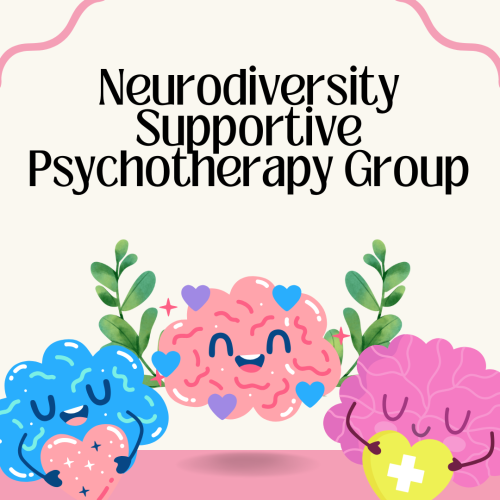Neurodiversity Supportive Psychotherapy Group

Families with members who have neurodiversity often face unique stressors and challenges. These families often wish they could have a support group to share their challenges and practical coping skills. Our team of dedicated mental health professionals have lived experiences in neurodiversity and will provide you with the support you need while equipping you with practical tools to build connection and resiliency and to improve coping. If you are a parent or a caregiver with loved ones living with ASD or ADHD or you are living with neurodiversity yourself, this group is designed for you.
This program uses concepts from Emotionally Focused Therapy to help you build personal resiliency and form secure connections with your family members living with neurodiversity. Practical tools and resources developed by world leading experts in ASD and ADHD will be introduced and opportunities for implementation will be provided in the groups. Be a part of an ongoing safe group that values mutual understanding, support, collective sharing, and encouragement. Participants receive content based on solid science, become part of a supportive community and have access to practical coaching in every session.
Program Schedule
This is an open group, allowing participants to join or leave at any time.
Date: Every Second and Fourth Tuesday
Time: 12:00pm – 12:50pm (English Group), 12:50pm-1:40pm (Cantonese Group)
Language: English and Cantonese
Format: Virtual via Zoom
A Mandarin group will be formed if there are sufficient Mandarin-speaking participants.
Learning Objective
- Concepts from Emotionally Focused Therapy will be used to guide building resiliency, and secure connections with your family member living with neuro-diversity such as ASD and ADHD.
- Practical tools and resources developed by world leading experts in ASD and ADHD will be introduced and opportunities for implementation will be provided in the groups. The groups will encourage family members to prioritize connecting before redirecting.
- Offer a supportive, welcoming, understanding, validating place to share the joys and stresses of living with neurodiversity in a family.
- Share practical challenges, tools and resources
Program Format
Each group session consists of 50 minutes of sharing and learning practical tools and resources.
- 50-minute led by Dr. Tat-Ying Wong, M.D.
- Reviewing and follow up on previous commitment
- Sharing challenges, gratitude and support to each other
- Sharing of practical tools and resources for managing mental health need
- Debriefing and making one commitment
We encourage participants to commit to completing assigned homework and to be present and accountable to others in the group.
Program Delivery:
- This virtual supportive group will be conducted using Zoom and will include presentations, videos, and small group breakout time. The meeting link will remain the same each week and will be provided to participants prior to each session.
- Languages offered include English and Cantonese. A Mandarin group will be formed if there are sufficient Mandarin-speaking participants.
Meet Your Lead Facilitator
Lead Facilitator:
- Dr. Tat-Ying Wong (MD, MTS, MDiv., AAMFT, CAMFT Clinical Fellow and Supervisor, ICEEFT Certified Therapist, Supervisor and International Trainer, Family Physician with Focused Practice in Psychotherapy)
- He is a physician and Emotionally Focused Therapy International trainer with family members with mental health needs.
Dr. Tat-Ying Wong is a General Practitioner who earned his Doctorate in Medicine from the University of Toronto and has extensive experience and training in marital, family, and sexual therapy. Dr. Wong is also the only Cantonese speaking certified EFT International Trainer, training thousands of social workers, counsellors, couple and family therapists, clergy, psychologists, physicians and nurses in Asia and North America. His special interests include premarital counselling, couples therapy, emotional disorders, trauma, neurodiversity, families in ministry, cultural contextualization of family therapy to Chinese families, family therapy related to medical problems and training and supervision of lay and professional helpers. Dr. Wong is involved in psychoeducation and regularly leads groups for individuals on self esteem, managing emotions, Hold Me Tight® and Created for Connection groups for couples, Hold Me Tight Let Me Go groups for families with adolescents, and other couple and parent training and support groups. Dr. Wong published the first and only EFT outcome study with Chinese couples based on Hold Me Tight and Created for Connection, showing couples improved their attachment security, dyadic adjustment and family functioning after the program.
Screening Consultation
If you are not a current patient of Dr. Wong, please download the Referral Letter Template and ask your Family Doctor to complete it for a screening consultation with Dr. Wong. You may email the completed form back to us at therapy@gracehealthcentre.ca or have your Family Doctor’s office fax it to 416-633-8099.
If you currently do not have a Family Doctor, an in-person screening consultation with Dr. Wong at Grace Health Centre (402-2830 Keele St, Toronto) will be arranged.
Course Fees:
The physician fee is covered by the Ontario Health Insurance Plan (OHIP). There is no charge for participants with a valid OHIP card.
- Standard Fee for those with a valid OHIP card: FREE
- Standard Fee for those without a valid OHIP card: CAD$399 + HST/ 24 sessions
- Optional fee* for the access to e-recordings of group sessions and links to resources: CAD$199 + HST
*The e-learning resources is not covered by OHIP hence participants need to pay for the learning resources.
Participants Agreement
- This is a supportive psychotherapy group that does not replace the need for professional help and medications. Participants need to continue their current treatment during the course. Even though the facilitators are trained and licensed mental health professionals, they are not acting as an individual therapist in their role as group facilitator. The course material are presented from a scientific perspective.
- Participants need to be stable, able to commit the time required, concentrate, absorb the key concepts, complete the basic exercises and not be at risk to themselves or others so that a safe, productive and supportive learning environment can be maintained. The facilitators will ask participants who need additional help to consult their helping professionals. Participants who are not suitable for the course will be provided with referral to other resources.
- Attendance of all the online sessions, engaging with the audio-visual and written course material for each session and participation in the in group discussions, sharing, self-reflection and skill building exercises are required for maximum benefit and growth.
- Participants will share what they are comfortable sharing and discussing since the sessions are recorded for members paying for the access to recordings. Please refrain from sharing anything that you may have concerns about group members knowing about you through the group or watching the recording. The group members in the group and watching the recording will commit to confidentiality to protect each other’s privacy.
- Participants who are absent for emergencies, illness and other reasons beyond their control are expected to notify the facilitator as soon as possible and complete the work for the session that they have missed to the best of their ability.
- I acknowledge that my personal and relational growth is my own responsibility and am willing to take this responsibility by facing myself, engaging and renewing my way of thinking, beliefs, attitudes, values, behaviour and experience without avoiding, blaming myself or others. I understand that I am fully and solely responsible for the results and decisions that I make regarding my use of this group. I release the facilitator, the resource developers and all related institutions and organizations from any and all liability and accept full responsibility for my involvement in this group and the use of any related materials.
- Participants can support each other through mutual acceptance, understanding, validation, empathy and encouragement.
- Participants are also required to complete self-assessments before and after the group to gauge their progress and encourage self-awareness and self-reflection, which is the first step in personal and relational growth.
- In emergency situations or times when the participant is at imminent risk of hurting him/herself or others, then he or she will need to go to the closest emergency department or call 911 for immediate assistance or 988 for suicide crisis.
- Participants may be involved in photographs, testimonies, and the production of short audio-visual clips for the purpose of promotion and helping other course participants.
- Participants understand the Risks of using electronic communication and that Grace Health Centre (GHC) Team will use reasonable means to protect the security and confidentiality of information sent and received using email and/or text messages. However, because of the risks outlined below, the GHC Team cannot guarantee the security and confidentiality of electronic communications.
- Use of electronic communications to discuss sensitive information can increase the risk of such information being disclosed to third parties.
- Despite reasonable efforts to protect the privacy and security of electronic communication, it is not possible to completely secure the information.
- Employers and online services may have a legal right to inspect and keep electronic communications that pass through their system.
- Electronic communications can introduce malware into a computer system and potentially damage or disrupt the computer, networks, and security settings.
- Electronic communications can be forwarded, intercepted, circulated, stored, or even changed without the knowledge or permission of the GHC Team or the patient.
- Even after the sender and recipient have deleted copies of electronic communication, back-up copies may exist on a computer system.
- Electronic communications may be disclosed in accordance with a duty to report or a court order.
- Videoconferencing using services may be more open to interception than other forms of videoconferencing.



 Date: Every Second and Fourth Tuesday
Date: Every Second and Fourth Tuesday Time: 12:00pm – 12:50pm (English Group), 12:50pm-1:40pm (Cantonese Group)
Time: 12:00pm – 12:50pm (English Group), 12:50pm-1:40pm (Cantonese Group) Language: English and Cantonese
Language: English and Cantonese Format: Virtual via Zoom
Format: Virtual via Zoom